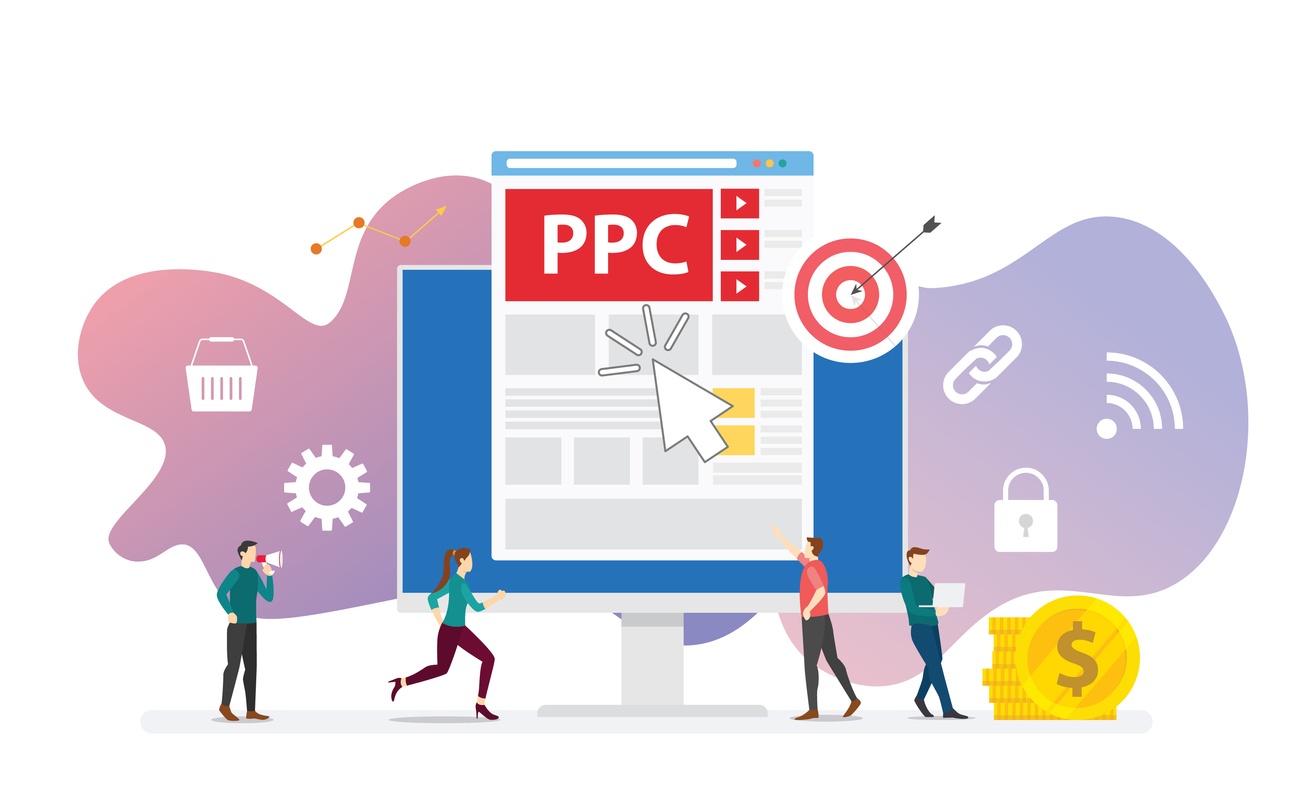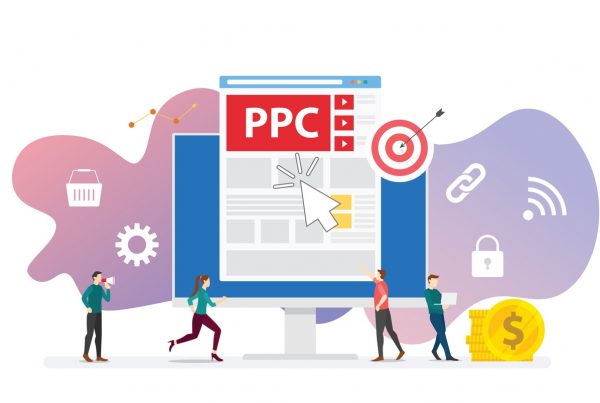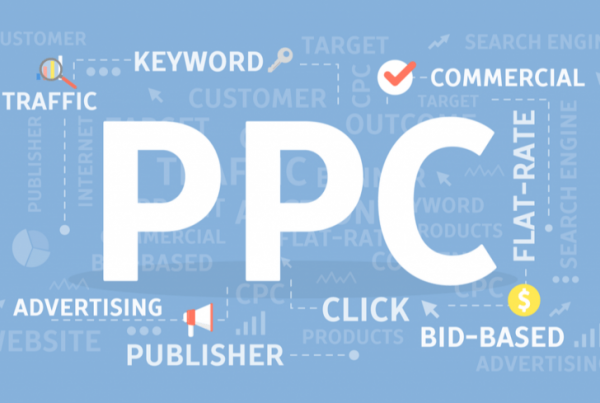
PPC is a very common way to go about online marketing for your business. There are a few pointers to keep in mind while writing blogs for PPC, and we’ll highlight them for you in this article. But, before we get started, we’ll give you a little insight into what PPC is and how it works.
What Is PPC & How Does It Work?
PPC is short for “pay-per-click”, and it is a mode of internet marketing where advertisers will pay a small fee every time one of their ads is clicked. It’s basically a way to buy visits to your page instead of “earning” them organically.
Search engine advertising is the most popular form of PPC as it lets advertisers bid for ad placement on sponsored links when a person searches for a keyword related to their business. An example of this would be if we bid on the keyword “marketing agency Amersham”, you’d probably see our ad show up in the top spot of Google’s results page.
With PPC, each time our ad is clicked, we have to pay the search engine a small fee. When your PPC strategy is proper and efficient, the fee is very trivial because the visit from the ad-click itself is worth much more than how much you pay for it. So, to put it in quantifiable terms, say we have to pay £3 for an ad-click, but the click itself results in a sale of £300, we’ve clearly made a good profit.
How to Write Successful PPC Blogs
Now that you have some context into what PPC is, we’ll highlight a few tips on how you can write better PPC blog posts for your website!
Depending on how often you post blogs, you probably upload a new post every day or week. Most companies give out great content consistently, but some completely miss the point. Hopefully, our article will help you be the former instead of the latter!
The tips we’re about to share with you can also be used for any other type of blog post too. Though centrally themed around PPC, these tips aren’t solely for paid search. In fact, these tips can also help you with client communication and writing ad copy.
If you don’t have the time to dedicate to blog writing and other digital marketing related things, you may want to consider hiring a PPC agency in London or a PPC agency in Amersham to help you. As a marketing agency in Amersham, we offer PPC, SEO services, and more!
See how our agency can drive massive amounts of traffic to your website
SEO :
Unlock massive amounts of SEO traffic see real results.
Content marketing :
Our team creates epic content that will get shared, get links, and attract traffic
Paid media :
Effective paid strategies with clear ROI.
Now, let’s get on to the tips!
- Focus on Everyday Activities
A lot of writers complain about not having many good ideas for blog posts. In reality, a good writer should have a few good ideas up their sleeve at all times based on their day-to-day activities. When you think about it like this, you’ll remember that a PPC manager does the following every single day:
- Creates new campaigns
- Optimizes existing campaigns
- Runs reports
- Communicates with clients
- Improves on internal efficiencies A major misconception is that your posts have to be all about the tactical side of PPC. They really don’t, though. Take inspiration from your everyday life and write accordingly. For example, you might have had a client meeting that went south, which could help you write an article on how to host better PPC meetings. Or perhaps you had a meeting with your agency rep, which could lead to an article all about working with Google. These everyday things actually make for the best kinds of blog posts. Make sure you always note down your ideas so you’ll always have some ideas to fall back on when you feel like you’re creatively stumped.
- Be Clear In Your Stance and Have Enough Backing to Defend Your Post The thing about writing is that no matter what you put out there, there will always be a person who disagrees. When you post an opinion piece or a post with an unpopular opinion, this will most likely strike up lots of debate. But, before you do this, you need to make sure you can defend your argument and feel confident about it. Always try to play Devil’s Advocate when you write pieces like this to stay on the safer side. Say you’re writing a blog about how site links aren’t important, before you do, ask yourself the following:
- Do I have evidence to support this?
- Are there other blogs/info about this that I can use as reference/support?
- Is my opinion on this strong enough? Then, go ahead and write your blog post, but make sure you make it a point to address the above questions. You could start off by talking about the common notion that site links are key in PPC strategies, and then move on to your disagreements with evidence to back it. A few readers may disagree with you, but at least you’ve presented it logically and with evidence.
- Keep Intangibles in MindJust like needing to defend your posts, you should also always keep intangibles in mind while writing. This holds specifically true for case studies. Say you’re going to compare the same keyword’s performance in two different match types, make sure you can speak about the study. You’ll want to touch on factors like time frame, optimization, and whether the same ad copy was used for both.When you keep intangibles in mind, you even come off as more genuine. You give your readers all the details of the study. This way, you’ll even have less comments asking about the study, and more about the findings.
- Aesthetics Are ImportantNo matter how brilliant your content is, most people will click off your post if it doesn’t have a pleasing aesthetic to it. Think of PPC landing pages. When they’re packed with content, without any image breaks and visuals, visitors leave without converting. So, try to keep your posts as aesthetically pleasing as possible.You can use lists to break up your text better, make your paragraphs less lengthy, and try not to pack too much info in one sentence (like I’m doing right now, see, it’s pretty hard to read and you’re probably already bored and want to click off this page, am I right?).That’s an example of a long sentence. Nobody likes long sentences. Try to keep your content short and precise!
- Get The “OK” From A Co-WorkerTry to share your post with a co-worker or friend who knows PPC well before uploading it to your website. This is a “dry run” and it helps you gain feedback and insights on your post. You can either have them comment on your word document, or just talk to you in real life with tips.
- Learn WordPress BasicsLots of websites use WordPress as their platform. You don’t have to be a pro, but it’s good to learn the basics. When you know the basic tags and functions, you can effectively promote and format your post. Try using the following:
- Header (h1-h6)
- Strong
- Also keep a good focus on SEO, because that’s very important for WordPress. You can download many SEO plugins to make sure that your posts have proper page titles and meta descriptions. This way, your organic listing will be better and can capture more clicks.
Conclusion
We hope this article helped you! If you really want to get the best out of PPC, you should definitely consider hiring a PPC agency in London or a PPC agency in Amersham. As a digital marketing agency in Amersham, we understand all your online needs and can help you improve your ranking significantly.
So, if you’re interested in exploding into the digital world, choose Explosion Digital for all your marketing needs!
We hope you enjoy reading this blog
If you need our expertise please book a meeting with us.












